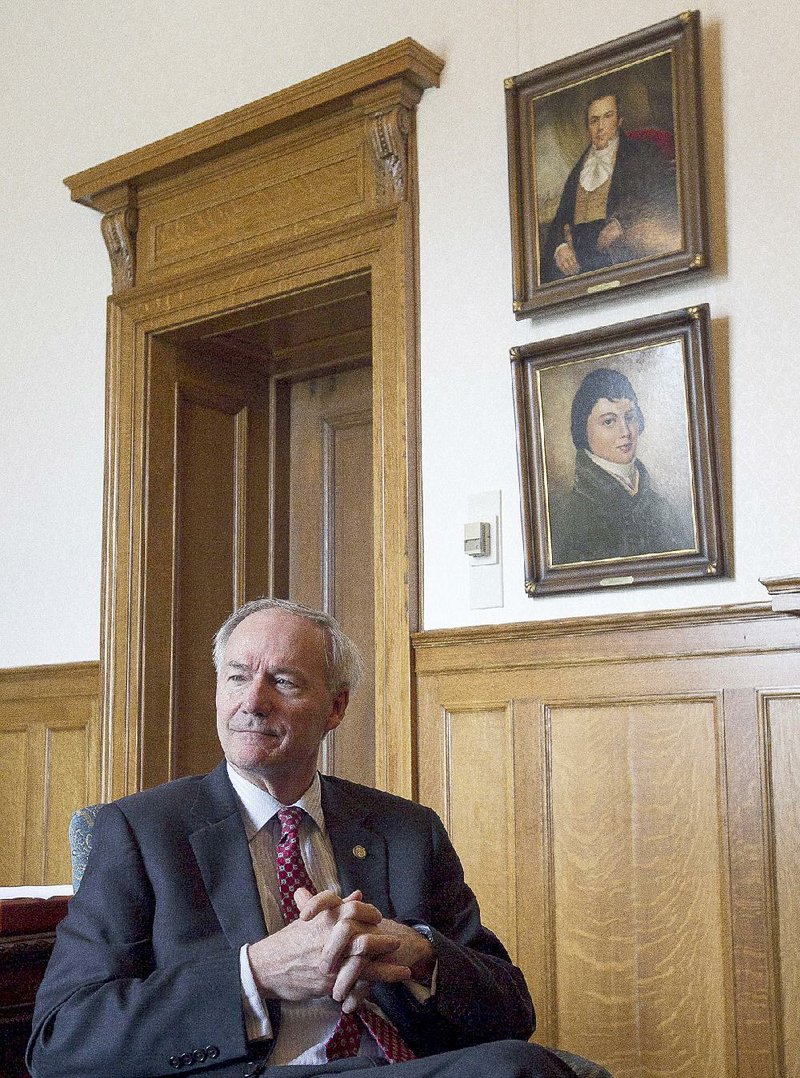Gov. Asa Hutchinson said Thursday that he wants the Arkansas Legislature to do more than make minor changes or rename the private-option program that uses federal Medicaid dollars to purchase private health insurance for low-income Arkansans.
The governor also raised the possibility of calling the Legislature into a special session -- separate from next year's fiscal session starting Feb. 8 -- to focus on enacting changes in the private option.
"Just in terms of integrity and honesty, I don't think that anybody who expects that this was the end of the private option wants it to be tweaked in minor ways and relabeled," Hutchinson told reporters in an interview in his office at the Capitol.
"That's not going to fly with the Arkansas voters, and that's not my expectation. I think this is going to be a total refiguring of it in an Arkansas way with compassion, but with fiscal prudence and ... also one that is innovative," he said.
Authorized under the 2010 federal Patient Protection and Affordable Care Act and approved by the Legislature in 2013, the expansion of the state's Medicaid program extended eligibility to adults with incomes of up to 138 percent of the poverty level -- $16,105 for an individual, for instance, or $32,913 for a family of four.
More than 190,000 Arkansans have been enrolled in health insurance through the private option, according to the state Department of Human Services.
The state will have to pick up 5 percent of the private option's cost starting in 2017, and its share of the bill will gradually increase to 10 percent in 2020, when Hutchinson said it will cost the state more than $200 million a year.
On Jan. 22, Hutchinson called on the Legislature to continue funding for the state's expanded Medicaid program through 2016 and to appoint a task force to develop an "alternative health coverage model" for "vulnerable populations" now covered by the private option.
The Legislature subsequently authorized the use of federal funds for the private option for the fiscal year starting July 1 and approved legislation to create a 16-member legislative task force to study changes in the state's entire Medicaid program, including the private option.
"I think the miracle of the session is the consensus that was developed over the debate on the private option very quickly and resolved that without the drama of previous sessions," Hutchinson said.
The private option has deeply divided Republicans because it is financed through the federal health care overhaul signed by President Barack Obama into law in 2010. Hutchinson is a Republican and the Legislature is dominated by Republicans.
Hutchinson said the private option was an innovative solution to provide health insurance for low-income Arkansans.
"I have a lot of confidence that we are going -- with a legislative task force -- to come up with a good solution for the future, and I am encouraged also by the flexibility that the federal government, I think, is going to continue to give Arkansas," he said. "We have got a good track record of responsibly handling waivers, and I think they will seriously look at a more block grant-type proposal from us."
House Speaker Jeremy Gillam, R-Judsonia, said in a separate interview that "I would assume that they are going to come back with some substantive recommendations for changes, just looking at who all is on the task force and the nature of the way they attack problems."
Hutchinson said the legislative task force, led by Sen. Jim Hendren, R-Sulphur Springs, who is Hutchinson's nephew, and Rep. Charlie Collins, R-Fayetteville, is going to come up "with solutions in sufficient time, but [lawmakers] will have to come back for a special session I would presume, when they get that final report."
He said he hasn't made a decision about whether to call a special session.
"A lot depends on the timing of the report and what is required," Hutchinson said.
"A special session gives us more flexibility in terms of time, but also you have less distractions," he said.
"Fiscal issues are important, and you want to devote attention to those, and I think the public expects a special session that would be devoted to this issue because it is a very large challenge for us and we have got to build a consensus for it, so I would suspect that would be more suitable to a special session versus a fiscal session."
Senate President Pro Tempore Jonathan Dismang, R-Searcy, said that "it is really too early to say whether we should have a special session or not."
Gillam said legislative leaders have tossed around the options.
"A lot of it will depend on whether there are any time-sensitive recommendations or issues that come about from waivers or cooperation we have to have with the federal government," he said.
Metro on 04/10/2015

